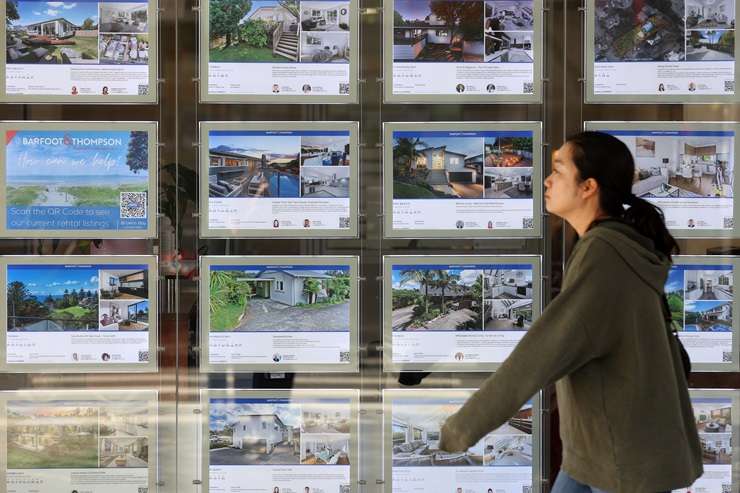The Reserve Bank has cut the Official Cash Rate for the first time since March 2020, taking the pressure off mortgage-holders and the housing market.
In its Monetary Policy Statement issued Wednesday, the RBNZ said annual inflation, currently at 3.3%, was returning to within the 1-3% target band.
It warned that the pace of further easing would depend on inflation remaining anchored around 2%.
Start your property search
The cut comes after the RBNZ raised borrowing costs to the highest level since the GFC in response to out-of-control inflation.
Banks had already priced in a cut to the OCR this year, dropping long-term fixed rates to below 6% in recent weeks.
The RBNZ’s language around interest rates has shifted in the last six months. In February and April, the central bank reasoned that the OCR would need to remain at a restrictive level for a “sustained period” to ensure inflation returned to the 1-3% target.
Discover more:
- Don’t get sucked in by 5.99% rates - fixing for longer ‘foolish’, warn experts
- Break fee warning: Homeowners tempted by lower rates risk harsh penalties
- How much money should Kiwis have in their bank account if they lose their job?
In May, however, the wording was slightly softer and more open to interpretation: “Monetary policy needs to remain restrictive to ensure inflation returns to target within a reasonable timeframe.”
And in July, the mood shifted again with the central bank declaring “monetary policy will need to remain restrictive” but that “the extent of this restraint will be tempered over time consistent with the expected decline in inflation pressures”.
The central bank’s forecasts have also shifted. In May, the quarterly average of the OCR wasn’t expected to fall until the second half of next year. Now, the central bank has the average falling steadily over the remainder of this year and next.
Ray White economist Nerida Conisbee said the current economic environment in New Zealand was grim. “The unemployment rate picked up to 4.6% in the June quarter, the highest level since the start of 2021. Home consents are down 24% over the past 12 months and consumer spending shows that the cost of living is tightening household budgets,” she said.
She predicted the cut would “likely to lead to house price growth across the country. House prices declined slightly over the June quarter by 1.9%, with Auckland and Wellington recording the largest declines of 2.7%. A key driver of the decline are high stock levels. New Zealand is currently a buyers market but buyers are likely to be running out of time to secure homes at these lower prices with the announcement today.”

Housing market experts believe the rate cut will give Kiwi buyers extra confidence. Photo / Fiona Goodall
Harcourts Cooper & Co managing director Martin Cooper said the cut was good news. “A lot of young New Zealanders, they’ve been encouraged and helped by the banks to get into property, and they borrowed a lot of money. A lot of them, all they've been doing for the last 18 months is working for the bank,” he told OneRoof.
“Interest rates going down will help everyone have confidence that it’s not going to get worse, that there are better times ahead.”
He added: “The Reserve Bank’s approach to reducing inflation has been brutal. We need further rate decreases. We need to get down to about four to trigger a dramatic change. The banks need to ease rates further to help wake up the economy.”
Harcourts Gold agent Cameron Bailey said the cut was a “move in the right direction, but it’s not a silver bullet”.
“It’s not going to change the market overnight. We need to be realistic. There’s still a lot of people out there that come off 3% interest rates and dealing with 6% to 7% interest rates at the minute so a small drop is positive but it’s not going to change the market too much.”

Harcourts Cooper & Co managing director Martin Cooper: "The Reserve Bank’s approach to reducing inflation has been brutal." Photo / Ted Baghurst
But Bailey said there was nothing wrong with the current market in Christchurch. “We’ve all just got to get our heads around that this market is fine. There’s plenty of buyers out there, there’s a good choice of listings – but not too many. It’s just a really nice market.”
He explained that there was enough choice, good properties were getting good prices and anybody who was unrealistic on price was being left behind. “That’s a fair market. It’s a market of honesty.”
Andrew Chambers, chief executive of online mortgage brokers Tella, said the high street banks had been expecting a cut for some weeks. “Everything had been priced in. They’ve already given away that 25 basis points over the last four to six weeks.
“Now we’re in a downward race cycle. We’ll see the variable rate get adjusted because there’s so much margin.”
He predicted one of the big banks would cut their five-year rate to 4.99% in the months ahead. “It’s a big call but 4.99% is really attractive. Banks are going to want to lock in [customers] longer-term. They don’t want all their money in six- and 12-month terms.
“They’ll be prepared to give away margin on those longer terms to get people locked in.”
He added: “We may not get back to where we were, 2%, but global conditions indicate that we are going to get back to low interest rates again.”
He said the cut would reassure Kiwis “they’re not going to pay any more for their borrowing”.

Westpac chief economist Kelly Eckhold: "Based off that Reserve Bank forecast, you would say that they are telling us it will be 75 points of cuts this year so there is a surprise there." Photo / Fiona Goodall
“With tax changes, people have got an extra $25 to $30 in their pocket, then interest rates come back a bit. It’s not big money, but it’s enough to give people a little bit of confidence that things are good.”
Westpac chief economist Kelly Eckhold said today’s announcement had come as a surprise to his team.
“Based off that Reserve Bank forecast, you would say that they are telling us it will be 75 points of cuts this year so there is a surprise there.”
And while the cuts to the OCR might be earlier than many expected, Eckhold warned the wholesale rates might not fall a lot further because many banks had already factored these changes in.
Floating rates would likely drop, but the other fixed rates had already fallen so there may not be any further drops until the next OCR announcement in October, he said.
“They seem to have the confidence. They’ve obviously cut now and I would assume that they are probably planning to cut at least based on their forecast two further times before Christmas.”
Eckhold said it now looked – based on the Reserve Bank’s projections – that interest rates would “end up at the same place but just a bit faster”.
Falling interest rates would normally be associated with a lift in housing market activity and rising prices but other factors could impact this, he said. “The question will be how large the price increase really is because the labour market is quite weak right now so that may also act against people getting too aggressive in housing.”
My Mortgage adviser Claire Williamson said it was great news because cheaper borrowing opened up more opportunities for people especially those who might have been struggling to service their mortgages.
“I think things are moving in a positive direction. It’s obviously going to relieve a lot of pressure, but I think people probably also don’t want to get too far ahead of themselves because it doesn’t mean rates are dropping considerably. There will still be a little bit of a coast in I think – it is not going to be happening overnight.”
Williamson said there was unlikely to be a sudden drop in interest rates due to today’s cut because it appeared to have already been factored in. Some of the longer-term rates might be shaved a bit, she said, but it was unlikely that the shorter-term six to 12-month interest rates would drop much more.
“We’ve seen a relatively significant drop in the last week or 10 days which suggests the banks were kind of prepared for it.”
CoreLogic chief economist Kelvin Davidson told OneRoof ahead of the rate cut that housing affordability was as important a metric as interest rates in the current market.
“While some measures of housing affordability such as years to save and value to income have improved, other measures such as rent as a share of income and mortgage payments as a share of income are still at record highs,” he said.
“Mortgage rates have been driving down anyway, but even if they improve, wage growth has slowed. The full story on housing affordability is not house price to income ratio, it’s about Kiwis’ ability to pay the mortgage, and that’s where interest rates come in.”
- Click here to find properties for sale









































































